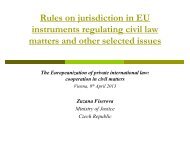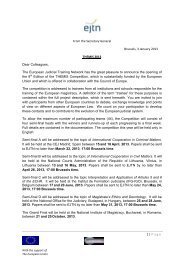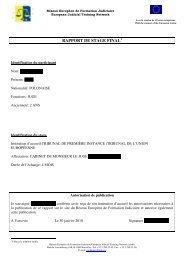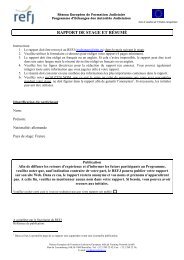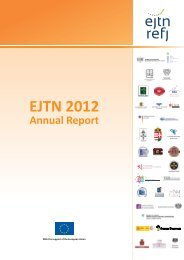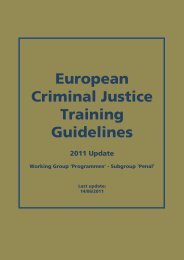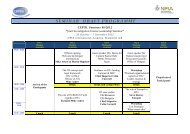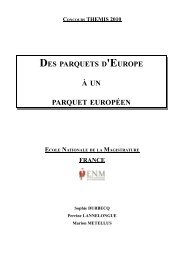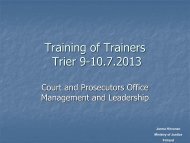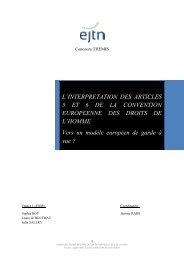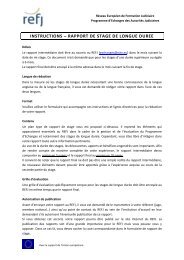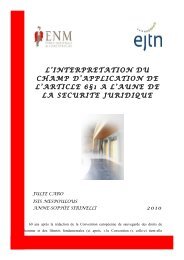Written paper Belgium_1.pdf - European Judicial Training Network
Written paper Belgium_1.pdf - European Judicial Training Network
Written paper Belgium_1.pdf - European Judicial Training Network
Create successful ePaper yourself
Turn your PDF publications into a flip-book with our unique Google optimized e-Paper software.
This secondment is legally provided in article 327,3° of the <strong>Judicial</strong> code. Nevertheless there<br />
is only one big problem: the posted magistrates have to play a dual role because they work in<br />
ministerial cabinets and therefore exercise a political function, while on the other hand they<br />
are part of a corps that rely on its independence as judiciary 22 . This blending of powers seems<br />
contrary to the ideology of the ‘trias politica’.<br />
A posted magistrate can experience a conflict between on the one hand the ‘deontology of<br />
magistrates’ that obliges him inter alia to independence, discretion and objective and<br />
subjective impartiality 23 and on the other hand to the habits and duties that applies to the<br />
personal employees of the minister (inter alia the duty of loyalty towards the political points<br />
of view of the minister, if necessary of its political party, the contacts that result from the<br />
public character of the function).<br />
The displaced magistrates of the Public Prosecutors Office are confronted with incompatible<br />
loyalties and practice de facto political functions, as functions on a cabinet are political and no<br />
officials functions.<br />
The fact that a magistrate who was posted in such a way fulfills a role that is socially very<br />
difficult and delicate, becomes apparent of Fortisgate, that late 2008 provided for a big<br />
commotion in the national and international press and even lead to the dismissal of the<br />
government.<br />
The attempts up to now to diminish the importance of posted magistrates on ministerial<br />
cabinets, seem to yield few tangible results. We keep finding members of the Prosecutors<br />
Office within the staff functions of the ministerial cabinets. Some may think that this is a<br />
excellent case, because this allows the minister to be optimal informed about the judicial<br />
reality 24 .<br />
This argument isn’t really pertinent considering this information is very fragmented, because<br />
the magistrate only speaks in his own name. Moreover this argument is only applicable in<br />
22 STEVENS, Jo, ‘Justitie in beweging krijgen’ in VAN RANSBEECK, R. “De toekomst van de Belgische Rechterlijke<br />
orde”, 93.<br />
23 Article 6.1 EVRM: right to a fair trial.<br />
24 MARCHANDISE, Thierry, ‘Le ministère public et le politique: ordres et désordres’ in “Justice et politique: je<br />
t’aime, moi non plus…”, Larcier, 2009, 104-105.<br />
20



